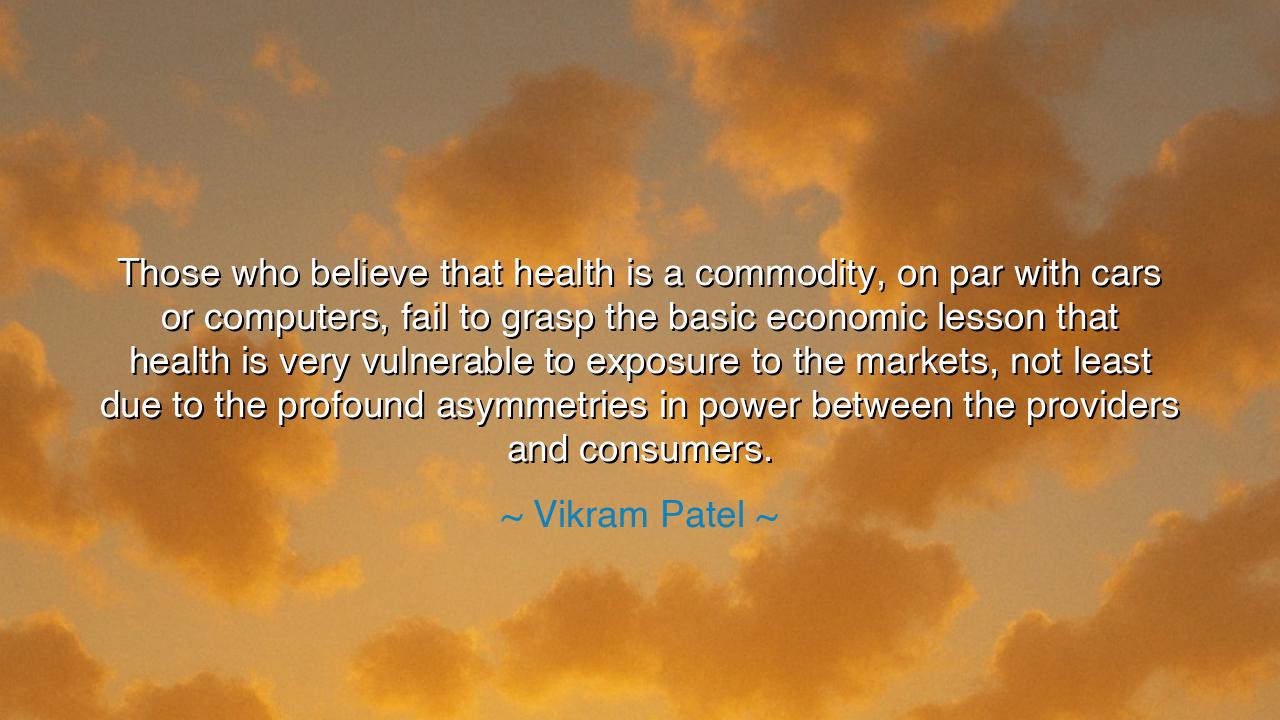
Those who believe that health is a commodity, on par with cars or
Those who believe that health is a commodity, on par with cars or computers, fail to grasp the basic economic lesson that health is very vulnerable to exposure to the markets, not least due to the profound asymmetries in power between the providers and consumers.






In the solemn and piercing words of Vikram Patel, physician and champion of global mental health, there echoes a truth as old as compassion itself: “Those who believe that health is a commodity, on par with cars or computers, fail to grasp the basic economic lesson that health is very vulnerable to exposure to the markets, not least due to the profound asymmetries in power between the providers and consumers.” These words are not merely a critique of systems, but a moral call — a reminder that health is not a product to be bought or sold, but the sacred foundation upon which all human dignity rests. Patel speaks as one who has walked among the sick and the poor, who has seen firsthand how the marketplace — that great engine of exchange — can fail the human spirit when it dares to treat life itself as a commodity.
In the ancient world, the healers were not merchants; they were custodians of life. The physician’s art was bound not to profit, but to service — to the preservation of balance between body, mind, and spirit. The Hippocratic Oath, sworn in the temples of Greece, was not a contract of transaction but of trust. It was an agreement between healer and patient, sealed by duty, not by price. Patel’s warning arises from the loss of this sacred understanding — from an age in which the art of healing has too often been reduced to a trade, and the patient has become a consumer, standing powerless before institutions that weigh health not by compassion, but by cost.
When Patel speaks of “asymmetries in power”, he names the great imbalance that haunts modern health systems. The sick, in their vulnerability, depend on the knowledge and mercy of the healer. But when that mercy is overshadowed by profit, the patient’s need becomes a weakness, easily exploited. The doctor becomes constrained not by conscience, but by contracts; the hospital becomes a marketplace where the price of care rises beyond the reach of those who need it most. In such a world, health — which should unite all people in shared humanity — becomes a measure of inequality. To expose it to the market without protection, Patel tells us, is to place the flame of life in the cold winds of commerce.
History bears witness to the ruin that follows when health becomes a privilege. In the Industrial Revolution, cities grew rich while their workers grew sick. The factories that birthed wealth also birthed plague — lungs blackened by soot, children bent by labor, families dying in filth while medicine remained a luxury for the few. It was only when reformers rose — like Florence Nightingale, who transformed nursing from charity into public duty, and Rudolf Virchow, who declared that “medicine is a social science” — that society began to see that health belongs not to markets, but to the moral fabric of civilization. Without it, nations crumble, for the strength of a people lies not in their wealth, but in their well-being.
Patel’s insight is born not of theory, but of life in the fields and villages of the world’s forgotten corners, where millions suffer not for lack of cure, but for lack of access. In those places, a mother’s illness means a child’s hunger, and a broken bone may spell lifelong poverty. Yet the market, blind to compassion, sees only numbers and demand. The asymmetry of power that Patel describes is not abstract; it is the cruel reality that the poor cannot bargain for their health when their very survival is the price. His words are a reminder that when the healing arts are left to the logic of profit, they cease to be healing at all — they become exclusion, the slow undoing of the social body itself.
And yet, Patel’s warning is not without hope. It calls upon the wisdom of both ancient and modern thought — that health is a public good, a right that binds the fates of all people together. Just as a city cannot flourish while its water is poisoned, no nation can thrive while its people are unwell. To protect health from the cold arithmetic of the market is to affirm the sacred worth of every human being. It is to restore the healer’s role as guardian of life, and the community’s role as caretaker of its weakest members.
The lesson, then, is clear and enduring: treat health as sacred, not as saleable. It is the duty of every society, every leader, every citizen to ensure that care is governed by conscience, not by commerce. The marketplace may build towers, but it cannot nurture souls; it may innovate tools, but it cannot heal hearts. To truly honor life, we must remember what the ancients knew — that healing is an act of solidarity, of love made visible through service.
So, children of the modern age, heed Vikram Patel’s wisdom. Build systems that serve life, not profit. Hold your healers in honor, not as merchants but as stewards of compassion. And when you measure a nation’s greatness, do not count its wealth or machines, but the well-being of its people. For as the ancients taught, and as Patel reminds us now: the health of one is the health of all, and the measure of a civilization lies in how it cares for the fragile miracle of the human body and soul.






AAdministratorAdministrator
Welcome, honored guests. Please leave a comment, we will respond soon